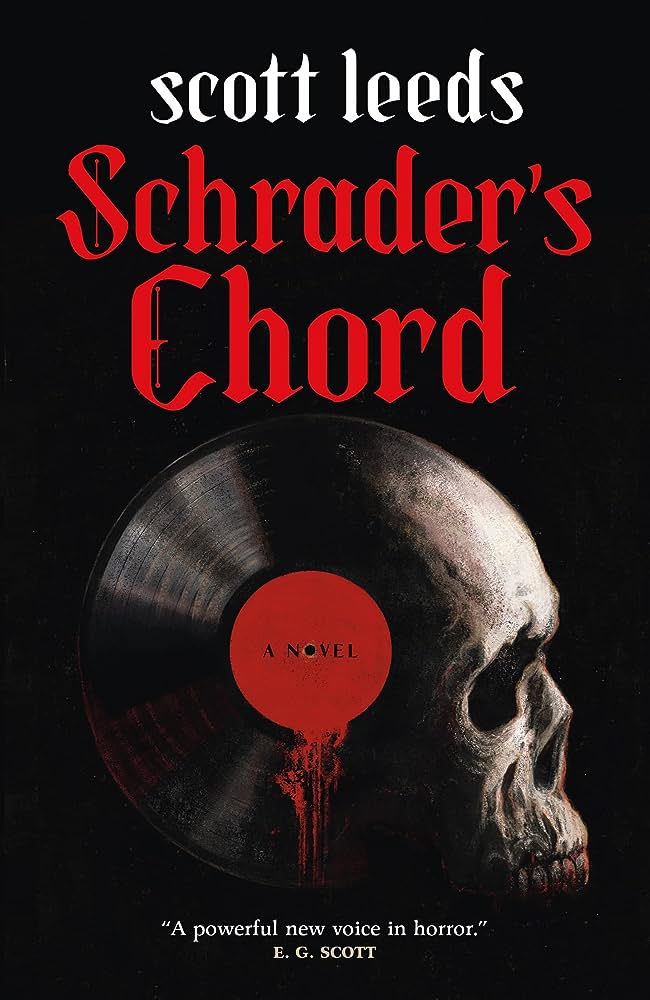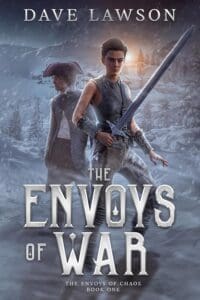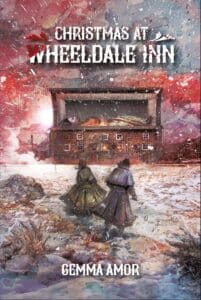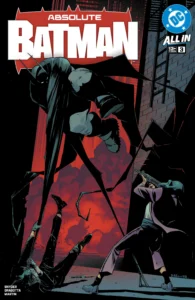
Book Information
Schrader’s Chord by Scott Leeds
Genre: Horror
Pages: 448
Publish Date: September 5, 2023
Publisher: Tor Nightfire
Synopsis
Heart-Shaped Box meets The Haunting of Hill House in Schrader’s Chord , Scott Leeds’s chilling debut about cursed vinyl records that open a gateway to the land of the dead.
I told you they were real.
After his estranged father’s mysterious death, Charlie Remick returns to Seattle to help with the funeral. There, he discovers his father left him two parting the keys to the family record store and a strange black case containing four antique records that, according to legend, can open a gate to the land of the dead.
When Charlie, his sister, and their two friends play the records, they unwittingly open a floodgate of unspeakable horror. As the darkness descends, they are stalked by a relentless, malevolent force and see the dead everywhere they turn.
With time running out, the only person who can help them is Charlie’s resurrected father, who knows firsthand the awesome power the records have unleashed. But can they close the gate and silence Schrader’s Chord before it’s too late?
Book Links
Amazon: https://amzn.to/3R34yXJ
Goodreads: https://www.goodreads.com/en/book/show/65212021
Bookshop.com: https://bookshop.org/p/books/schrader-s-chord-scott-leeds/19537861
Author Biography

Scott Leeds lives in the Pacific Northwest. Schrader’s Chord is his first novel.
Interview
Days before the release of his debut novel, Schrader’s Chord, I was fortunate enough to sit down and interview Scott Leeds. Given that he wrote Schader’s Chord prior to the COVID-19 pandemic, things are now quickly picking up steam as publish day approaches on September 5th. We had a truly delightful, wonderful chat for nearly an hour, focusing on his book and the writing experience in addition to art, music, Ray Bradbury, and so much more.
Jumping right in, we begin to discuss the marketing around his debut work of horror. One of the most impressive things about Scott (in addition to his writing) is his experience in marketing and graphic design. We joked about how in every project he’s worked on in the film industry he’s wanted to employ the same style of 70s/80s ads that we’ve been able to see in promos for Schrader’s Chord. He recalls looking at print ads and magazines in his youth, drawing inspiration from a now-dying art within print marketing. This was really his time to shine and flex his creative muscles not just with the novel, but in selling it as well.
Scott subtly drops wanting to employ this same marketing strategy to his next novel which of course grabbed my attention. It was confirmed that he is indeed working on another book, something he is hoping to lean a little more into the horror aspect of. However, the real bulk of our conversation focuses on art, specifically music and books, and what they mean to every individual person. There is nothing so unique to the human experience as one’s taste in music or books, yet we can find a collective interest as a group.
The emotional depth of the arts and Schrader’s Chord is a mutually agreed upon sentiment. This is deeply rooted in Scott’s personal experiences with music. He recalls sitting in his parents’ home going through stacks of records, establishing this love early in life. He mentions his father’s zest for music and his own time spent working in record shops. One of the most unique facts about these close, familial ties is the mention of his own grandfather’s radio station based in Montana within Schrader’s Chord. His mother used to deejay there for a time, a true sense of love imprinted in familial DNA for music.
Given that Scott is from the Pacific Northwest, it wouldn’t be a conversation about music without mentioning the impact of the grunge rock movement in the 90s in Seattle. At this point I lose my cool a little and bring up my love for Dave Grohl, comparing seeing the Foo Fighters years ago to a religious experience. Scott knowingly smiles and shakes his head; he gets it. From there he explains all the different musical instruments he took an interest in (there were lots). However, first and foremost were the drums. In the way he speaks about his former drum set, it’s clear to see his love for the craft and how much this all means to him. This genuineness is truly what makes his work of fiction shine; he’s not afraid to leave parts of himself available for the reader to experience.
I asked him what exactly gave him the nudge to put pen to paper. Immediately, he recalls the little boy he used to be who picked up Ray Bradbury for the first time, taking an interest in The Halloween Tree. This creative curiosity was fed by playing in bands, but the collaborative effort of music cannot be overstated enough. Especially in bands, each person has their own ideas and dreams to achieve, making the process of creating sometimes less than enjoyable. We found ourselves discussing that making art business almost always results in the fun being zapped right out of it. Much like in school, being given a reading list ensures that reading is the last thing on any kid’s agenda, even those who are bookworms. We share the same memory of Gatsby’s green light being a metaphor as a constant memory of high school English class. Despite this universally shared high school literary trauma, Scott found the idea of unleashing his creative freedom on his own through writing enticing.
Scott’s love for reading can be easily compared to his history with music. When asked about what books mean the most to him, he recalls reading (and rereading) S.E. Hinton’s The Outsider while in grade school. Beyond this, his love for Ray Bradbury is incredibly transparent. His reading list contains titles such as Fahrenheit 451, The Illustrated Man, and The Martian Chronicles. I can’t help but relate to him and my own experiences with Bradbury. We share laughs over the most American novel ever written, Dandelion Wine, and the fact that it does sometimes take, indeed, ten pages to describe how green grass feels under your bare feet. We share the sentiment found in both music and literature that certain works mean one thing to you as a child and then transform to take on something completely different in adulthood. That’s the beautiful thing about art, the dual nature of fluidity and permanence.
When asked about current reads, we land on the topic of how universal horror is these days across the genre, especially in books like Liz Kerin’s Night’s Edge, Chuck Tingle’s Camp Damascus, and C.J. Leede’s Maeve Fly. There are more than enough emotional horror novels on the market today, Schrader’s Chord being no exception. The genre doesn’t leave much room for interpretation with every aspect nearly cranked to ten, forcing readers to acknowledge the emotional weight of so many of these stories. We discuss this and the different kinds of horror, the fear of dying alone versus the big bad scaries that creep out from under the bed. The most impactful stories are ones in which we care so much about the character, we want them to win. Both Scott and I are character-driven kind of people; we get the most out of a story when we can empathize with those on the page.
This brings up our next topic: our mutual gravitation towards the character of Ana Cortez in Schrader’s Chord. Scott mentions that he found inspiration for his characters from his friends especially during COVID when spending time with them wasn’t an option. What’s the best alternative? Spend some time with their fictional selves. He also mentions he finds that he’s placed more of himself in the character of Ana rather than Charlie. Regardless of who he is most like, there is a certain authenticity to every character encountered in Schrader’s Chord. To me, this is most exemplified through our discussion of the reoccurring quote in the novel: “Everyone loves the Eagles, everyone hates the Eagles, it’s all the same.” This stems from the constant drabbles Scott often encountered among his friends working in record stores. There’s a certain lifeforce in the mundane that’s able to be harnessed in these little moments, breathing life into the ordinarily plain.
As things began to wrap up at the top of the hour, we covered a few extra topics. At the heart of the matter, Scott’s biggest hope is that his novel will mean something to someone somewhere. We agreed that putting your heart into a work of art can truly make all the difference in the world. The characteristic of genuineness cannot be overstated enough. If you’re honest and vulnerable with your readers, you’re more than halfway there. He understands that it may not be for everyone, but if this book has an emotional impact on any one person out there, he’s done his job. As far as I’m concerned, job well done, sir. I’ll never be able to listen to “The Picture” by Hubert Kah the same again.




Leave a Reply